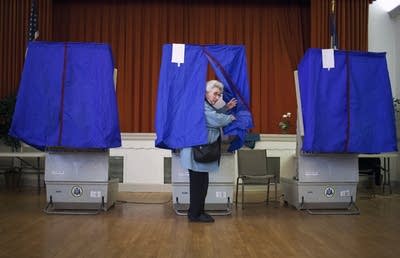Will Washington partisanship lead to more voter apathy?

As President Barack Obama gets set to take the stage at the Democratic National Convention Thursday night, we'll likely hear a lot about the promises he says he kept and what he hopes to continue working on if he gets another four years in office.
But even if voters decide to trust and re-elect him come November, do they really think that the partisan gridlock of Washington will improve?
"Unfortunately, I don't think so," wrote Mike Slagenweit-Coffman on Facebook. "With the hyper-partisanship on both sides of the aisle, moderates are ostracized and pushed to the fringes, and decent third-party candidates unable to break into the mainstream, I don't see either candidate changing Washington anytime soon."
G. Terry Madonna, director of the Center for Politics and Public Affairs at Franklin and Marshall College, joined The Daily Circuit discussion Thursday. He said Obama will be working to convince Americans that no president could pull the country out of the recession faster and he's setting the economy on the right path moving forward.
Create a More Connected Minnesota
MPR News is your trusted resource for the news you need. With your support, MPR News brings accessible, courageous journalism and authentic conversation to everyone - free of paywalls and barriers. Your gift makes a difference.
"Economists call this the new normal: low growth, not a lot of job creation, lots of people out of work," he said. "What I think Clinton also tried to do last evening and I think what the president will do tonight is to make the argument that there has to be a sense of realism about the current economic plight our country faces. There won't be a quick fix to this."
If Obama is re-elected and Congress stays in a similar split, it's unlikely Washington will emerge from the partisan gridlock we're seeing today. National Journal Editor-in-Chief Ron Fournier said voters have lost faith in the system and major changes need to happen.
"By the time I am done writing, say another 20 years from now, I won't be writing about the Democratic and Republican Parties the way they are now," he said. "One of the parties will probably be blown up and the other one is going to have to change itself dramatically if it's still going to be around. The idea that these parties have a right and a lock on the ballot is absurd... The American public has more power than they've ever had."
On Facebook, Jorg Lueke suggested a change in how votes are counted.
"As far as reducing partisanship I think we should get rid of the Electoral College and gerrymandering," he wrote. "Force politicians to get votes from everyone not just the indecisive."
Fournier said gerrymandering is a serious issue when it comes to voters having the power to elect politicians who are willing to compromise. New technology makes it easier for lawmakers to divide up voters into districts to benefit one political party.
"Now politicians in Washington don't worry about winning the general election; all they worry about is winning their primary," he said. "So if you're a Democrat, all you care about is being really liberal. If you're a Republican, all you care about is being really conservative... Politics is so screwed up right now that people do want compromise, but they aren't allowed to elect compromisers."
Join the conversation on Facebook.
